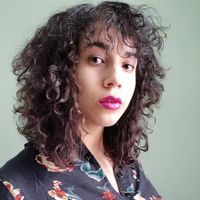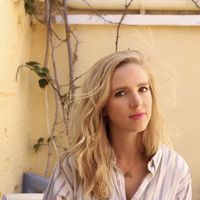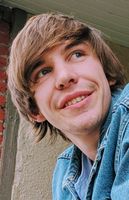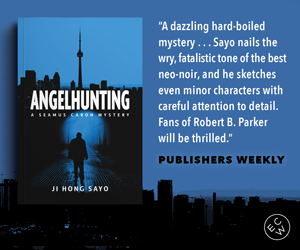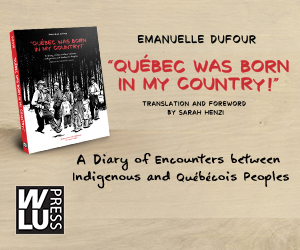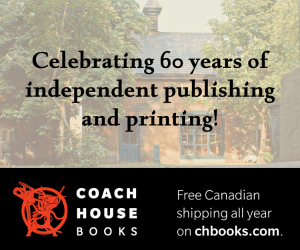"These Poems Attempt the Impossible" The 2019 RBC Bronwen Wallace Award Nominees on Poetry, CanLit & More
The RBC Bronwen Wallace Award for Emerging Writers, administered by the Writers' Trust and sponsored by the Royal Bank of Canada, has a downright impressive track record of recognizing remarkably talented poets and prose writers early in their careers. Alternating between poetry and short fiction each year, it has honoured writers including Michael Crummey, Sonnet L'Abbé, Dina Del Bucchia, and many more in its 26 year history.
This year, Rebecca Salazar is nominated for her poetry suite "Your Public Body"; Ellie Sawatzky for poems from her manuscript Unorganized Territory; and John Elizabeth Stintzi for "Selections from Junebat" from their manuscript Junebat.
We're thrilled to have all three of the 2019 finalists on Open Book today to talk about poetry as a form, their writing processes and journeys, and what being nominated for such a prestigious award means to them right now.
We hear from the finalists about their award-nominated work (and its inspirations, from justice for survivors to isolation and self-exploration in New Jersey), what they love about poetry and how they view the form, and the poet who not one, but two finalists named as a Canadian favourite.
The winner of the 2019 prize, who will receive $10,000, will be announced at an event in Toronto on May 28, hosted by CBC's Shelagh Rogers. Each of the remaining finalists will receive $2,500. The 2019 jury is comprised of poets Jordan Abel, Sue Goyette, and Emma Healey.
Open Book:
Tell us about the poem for which you were shortlisted, and when it was written.
Rebecca Salazar:
"Your Public Body" is a suite of three poems about the silencing of sexual assault survivors. The title is a line from the first poem, which addresses the legal silencing via defamation suits of survivors who come forward. All three poems were written over this past winter, while working through my own trauma, and through anger about recent silencing lawsuits that target a number of writers in Canada who came forward with allegations of sexual assault. It feels like I’ve been writing these same poems for years, while attempting to piece together my own story, and while watching other survivors and even their supporters be punished for telling theirs. All three poems rely on others’ voices to speak, in the form of epigraphs and/or lines from the Canadian Civil Liberties Association, from Joelle Barron’s poetry collection Ritual Lights, and from Roxane Gay’s memoir Hunger. I’m still learning (and grieving) the covert ways survivors must use to support one another.
Ellie Sawatzky:
There are seven poems in my shortlisted manuscript, entitled Unorganized Territory, and they were all written between September 2018 and February 2019. A couple of them were written during a 30 Poems 30 Days challenge in November called Novemberotic, that I co-curated through my Instagram, @impromptuprompts. Social media features in the poems. Also Tinder, Wikihow, Spotify, and Craigslist. The final poem, "Kenora, Unorganized", is the most recent, written in my hometown where I was staying with my parents this past winter. When I’m in my childhood home, the weather app on my phone tells me I’m located in "Kenora, Unorganized" (and that, in January & February, it is -46 more often than not, which is just plain mean). Unorganized territory is any geographic region that doesn’t form a part of a municipality. The poem is about feeling disconnected, disorganized, lonely and cold. It’s about survival, and the seemingly unlikely path that life (and poetry) can take.
John Elizabeth Stintzi:
The three poems in "Selections from Junebat" are from my poetry manuscript Junebat, which is set during the year I lived—in quite extreme isolation—in Jersey City, when I first gave myself space and time to earnestly reflect on my gender and sexuality. These poems are from a suite of poems which centre specifically around the "Junebat" itself, which is an invention rooted in my personal frustration with the many labels of queer identity (mostly in respect to gender), which are many, and many are quite specific—which I personally found unhelpful.
The Junebat instead allowed me to grapple with who I was head-on, and throughout these three poems the Junebat is a contradictory, slippery, antagonistic vessel that is filled more with questions and smoke than any myth of clarity. These poems attempt the impossible: to try and define and interrogate something which the speaker believes exists, believes they are, all the while failing to give a consistent portrayal of it—because to be honest about identity, for me, is to be honest of its inconsistency.
OB:
What do you love most about writing poetry? What does the form mean to you?
RS:
I find poetry lends itself to writing about things that resist telling in any linear fashion. Poetry, for me, is a fluid, polyvocal form, and very grounded in the body and sensory experience—it allows you to embody what cannot be easily narrated or explained.
Your CanLit News
Subscribe to Open Book’s newsletter to get local book events, literary content, writing tips, and more in your inbox
ES:
What I love most about writing poetry is how it surprises me, how it takes on a life and energy of its own. This is also, ironically, the thing I dislike most about poetry. It can be very frustrating to sit down with a plan in mind and have the metaphorical waters abruptly change course (anywhere between 10 to 1000 times per draft). Or they just stand still until I give them what they want. But every time I write a poem I learn something new about myself and my process, and I’m starting to trust it more and more.
When a poem is sent out into the world, it continues on a trajectory; it’s read by others, maybe it impacts them in some way, leaves an impression. This happens to me often when I read other folks’ poetry; whether it punches me in the gut or makes me cry or gives me goosebumps or alarms/calms me (or all of the above), I love how the form can create such intense experiences through distilled narrative/lyricism. It’s very wonderful to receive feedback that my own poems are being enjoyed, are creating experiences.
JES:
It might be that I never know what I’m doing. There’s something doomsday feeling about writing poems, where at the end of writing a poem I always wonder if maybe that poem will be the last one I ever write. After writing one, I don’t always believe I will have what it takes to write another, and often I will not write a poem for six months or more only to find myself writing five within the space of a week. This is hugely different from the more diligent and replicable relationship I have with fiction.
Poetry as a form means a lot to me because of this intermittence, but also because unlike my fiction my poetry is the space where I write things that are so near the bone you might mistake my lines for my ribs. I love my poetry because they remain things I can look back at and see who and where I’ve been, where I can see what obsessions or pains pinned down my being.
OB:
Tell us a little about where you are in your writing life currently. What does being nominated for the award at this stage mean to you?
RS:
A few years ago, I nearly gave up writing. I’d had the enormous privilege to pursue graduate studies in creative writing, and to find a supportive community, but trauma and mental illness nearly lost me everything—my academic program, my relationships, and my writing. Even when I wanted to give up, writing helped me through the worst my brain could do. I’m still cautiously emerging from this period, and receiving this nomination for these poems in particular has made me feel believed in an oddly public way that I haven’t felt before. It’s a gift for which I’m grateful.
ES:
At this stage in my writing life, I’ve been gathering publication credits for both poetry and fiction. My poetry has been published in chapbook form (Rhinocerotic, Frog Hollow Press 2018). I’ve been very fortunate to have received such great support along the way from mentors and peers and family. Being nominated for this award at this stage is very inspiring, very motivating. I’m so grateful to the jury, Jordan Abel, Sue Goyette, and Emma Healey, for treating my work so kindly. I feel excited to keep working and to put the finishing touches on my first full-length poetry collection.
JES:
Coming into 2019, I felt like I’d hit a plateau: I’d finally found my work in some truly wonderful magazines, I had a chapbook of poetry (that human people read), and I’d just done a residency (that I didn’t have to pay for). But I also had also been failing and failing and failing to sell my first novel—or any book—for the last year and was dispirited to think that my career had stalled.
But then in March I was informed—within days of one another—that I had a) won The Malahat Review’s Long Poem Prize, and I had b) been shortlisted for this award from the Writers’ Trust. These two recognitions—especially the Bronwen—really buoyed me, and ever since I’ve been surprisingly (comparatively) serene about where I am at in my writing, in that I feel like maybe there’s still some altitudes left to climb.
OB:
If you could recommend one Canadian poem or collection to readers, what would you choose and why?
RS:
Choosing only one feels counter-intuitive to me, since the most powerful thing I’ve found in poetry is the solidarity that builds between communities of queer and racialized poets; BIPOC women and queer poets have taught me so much, collectively (Dionne Brand, Gwen Benaway, Liz Howard, Natalie Wee, Soraya Peerbaye, and Canisia Lubrin, to name just a few). I am completely biased, and definitely cheating the question at this point, but if I have to recommend only one thing for people to read, it would be the new work coming out in literary magazines. I have the pleasure of editing for two magazines currently, and watching revolutionary new poets begin to find their voices feels electric.
ES:
I would recommend Ritual Lights (icehouse press 2018) by Joelle Barron. Barron’s poetry and wisdom have been a huge influence in my life. They are a fellow poet from Northwestern Ontario. They weave these weird, wonderful, heartbreaking narrative moments into rural landscapes, grounded in specifics and yet somehow universal. The poems in this collection are shivery, fierce, tender, funny, nostalgic, and wise. They tell of suffering and loss, sexual violence, the journey towards healing, and the eventual triumph of queer love and family. Barron writes with an honesty that feels subversive and crucial. I’ve read this book over and over since it came out last year and it still gives me full-body chills. Barron is also currently a finalist for the Dayne Ogilvie Prize for LGBTQ Emerging Writers through the Writers’ Trust(!).
JES:
My reading life has been pretty dry for last six months or so, but my favourite book of Canadian poetry from the last few years is Joelle Barron’s Ritual Lights. Some of my love comes from the fact that Barron hails from my part of northwestern Ontario (they grew up in the city where I was born, which was only an hour and a half from where I grew up) and lately I’ve been so hungry for art that takes place anywhere near the parts of the world I think of as home. The poems in Ritual Lights are also—of course—incredible, but paired with the fact that Barron grew up so close to me, is queer and writing amazing poems about beautiful, painful things—it really validated my entire existence. Also, Joelle Barron was just named a finalist for the Dayne Ogilvie Prize for LGBT Emerging Writers, so it’s as good a time as any to get caught up on their work!
______________________________________
Rebecca Salazar is the author of the knife that justifies the wound (Rahila’s Ghost) and Guzzle (Anstruther Press). Recent publications include poetry and nonfiction in Briarpatch, Minola Review, and The Puritan. Salazar is currently a poetry editor for The Fiddlehead and Plenitude magazines, and a PhD candidate at the University of New Brunswick.
Ellie Sawatzky is originally from Kenora, Ontario. Her poetry and fiction have appeared in CV2, Room, Prairie Fire, Little Fiction, The Matador Review, The Puritan, EVENT, and elsewhere. She holds an MFA from UBC’s Creative Writing Program, and is the author of the poetry chapbook Rhinocerotic (Frog Hollow Press 2018). She lives, writes, and borrows dogs in Vancouver. Find her at www.elliesawatzky.com, and on Instagram as @impromptuprompts for writing inspiration.
John Elizabeth Stintzi is a non-binary writer who was raised on a cattle farm in northwestern Ontario. They are the winner of the 2019 Long Poem Prize from The Malahat Review, and a selection of their work can be found (or is forthcoming) in Black Warrior Review, PRISM International, Ploughshares, The Fiddlehead, and their poetry chapbook The Machete Tourist. They currently live in Kansas City, MO, with their partner. Find John on Twitter @Stintzi.
The RBC Bronwen Wallace Award for Emerging Writers was founded in honour of poet and fiction author Bronwen Wallace, who passed away from cancer in 1989. It is open to writers under the age of 35 who are unpublished in book form.
You can read all the nominated poems via free download exclusively on Apple Books and you can learn more about each of the finalists on the Writers' Trust website.
